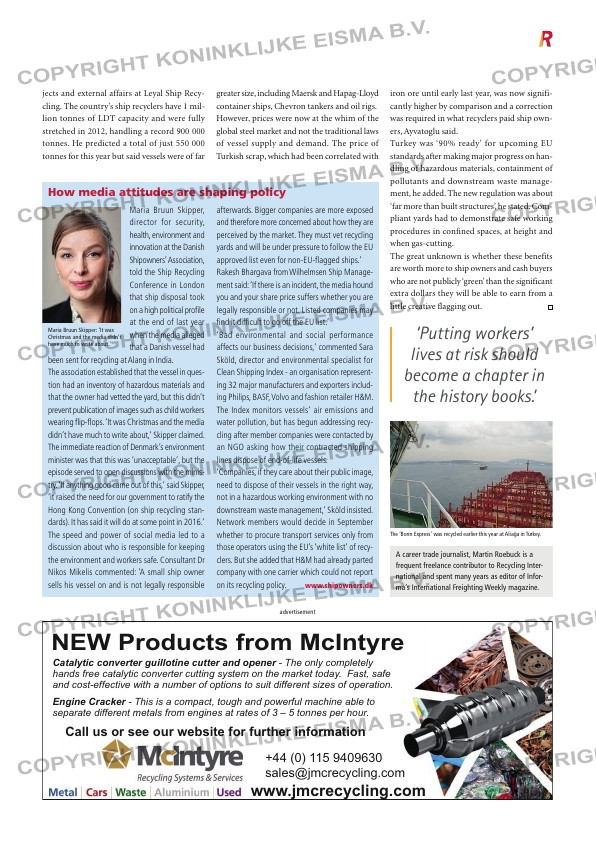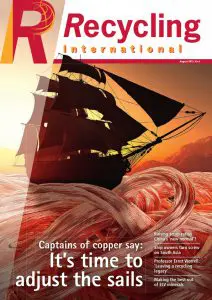Page 45 from: August 2015

A career trade journalist, Martin Roebuck is a
frequent freelance contributor to Recycling Inter-
national and spent many years as editor of Infor-
ma’s International Freighting Weekly magazine.
advertisement
How media attitudes are shaping policy
Maria Bruun Skipper,
director for security,
health, environment and
innovation at the Danish
Shipowners’ Association,
told the Ship Recycling
Conference in London
that ship disposal took
on a high political profile
at the end of last year
when the media alleged
that a Danish vessel had
been sent for recycling at Alang in India.
The association established that the vessel in ques-
tion had an inventory of hazardous materials and
that the owner had vetted the yard, but this didn’t
prevent publication of images such as child workers
wearing flip-flops. ‘It was Christmas and the media
didn’t have much to write about,’ Skipper claimed.
The immediate reaction of Denmark’s environment
minister was that this was ‘unacceptable’, but the
episode served to open discussions with the minis-
try. ‘If anything good came out of this,’ said Skipper,
‘it raised the need for our government to ratify the
Hong Kong Convention (on ship recycling stan-
dards). It has said it will do at some point in 2016.’
The speed and power of social media led to a
discussion about who is responsible for keeping
the environment and workers safe. Consultant Dr
Nikos Mikelis commented: ‘A small ship owner
sells his vessel on and is not legally responsible
afterwards. Bigger companies are more exposed
and therefore more concerned about how they are
perceived by the market. They must vet recycling
yards and will be under pressure to follow the EU
approved list even for non-EU-flagged ships.’
Rakesh Bhargava from Wilhelmsen Ship Manage-
ment said: ‘If there is an incident, the media hound
you and your share price suffers whether you are
legally responsible or not. Listed companies may
find it difficult to go off the EU list.’
‘Bad environmental and social performance
affects our business decisions,’ commented Sara
Sköld, director and environmental specialist for
Clean Shipping Index – an organisation represent-
ing 32 major manufacturers and exporters includ-
ing Philips, BASF, Volvo and fashion retailer H&M.
The Index monitors vessels’ air emissions and
water pollution, but has begun addressing recy-
cling after member companies were contacted by
an NGO asking how their contracted shipping
lines dispose of end-of-life vessels.
‘Companies, if they care about their public image,
need to dispose of their vessels in the right way,
not in a hazardous working environment with no
downstream waste management,’ Sköld insisted.
Network members would decide in September
whether to procure transport services only from
those operators using the EU’s ‘white list’ of recy-
clers. But she added that H&M had already parted
company with one carrier which could not report
on its recycling policy. www.shipowners.dk
Maria Bruun Skipper: ‘It was
Christmas and the media didn’t
have much to write about.’
iron ore until early last year, was now signifi-
cantly higher by comparison and a correction
was required in what recyclers paid ship own-
ers, Ayvatoglu said.
Turkey was ‘90% ready’ for upcoming EU
standards after making major progress on han-
dling of hazardous materials, containment of
pollutants and downstream waste manage-
ment, he added. The new regulation was about
‘far more than built structures’, he stated. Com-
pliant yards had to demonstrate safe working
procedures in confined spaces, at height and
when gas-cutting.
The great unknown is whether these benefits
are worth more to ship owners and cash buyers
who are not publicly ‘green’ than the significant
extra dollars they will be able to earn from a
little creative flagging out.
‘Putting workers’
lives at risk should
become a chapter in
the history books.’
The ‘Bonn Express’ was recycled earlier this year at Aliaǧa in Turkey.
jects and external affairs at Leyal Ship Recy-
cling. The country’s ship recyclers have 1 mil-
lion tonnes of LDT capacity and were fully
stretched in 2012, handling a record 900 000
tonnes. He predicted a total of just 550 000
tonnes for this year but said vessels were of far
greater size, including Maersk and Hapag-Lloyd
container ships, Chevron tankers and oil rigs.
However, prices were now at the whim of the
global steel market and not the traditional laws
of vessel supply and demand. The price of
Turkish scrap, which had been correlated with
www.jmcrecycling.com
+44 (0) 115 9409630
[email protected]
NEW Products from McIntyre
Engine Cracker – This is a compact, tough and powerful machine able to
separate different metals from engines at rates of 3 – 5 tonnes per hour.
Catalytic converter guillotine cutter and opener – The only completely
hands free catalytic converter cutting system on the market today. Fast, safe
and cost-effective with a number of options to suit different sizes of operation.
Call us or see our website for further information
RI-6-shipbreaking.indd 45 05-08-15 15:51



